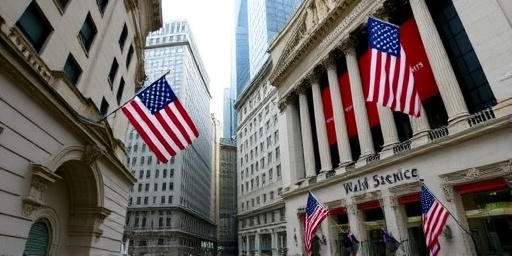In a week that kept traders on edge, the U.S. Stock market delivered a rollercoaster ride, with the Dow Jones Industrial Average swinging by over 1,000 points in a single day. This volatility, unfolding just as Americans gear up for Thanksgiving, has laid bare the fragile investor confidence amid whispers of broader economic stability issues. The S&P 500 dipped into correction territory mid-week, erasing gains from the past month, while the Nasdaq Composite saw tech giants like Apple and Amazon fluctuate wildly. As Black Friday approaches, the question on every investor’s mind is whether this is a temporary blip or the start of a deeper downturn.
- Monday’s Inflation Shock Triggers Wall Street Sell-Off
- Tech Sector’s Wild Ride Amid Rate Hike Fears
- Geopolitical Tensions and Supply Chain Woes Compound Market Jitters
- Analyst Perspectives: Decoding the Assault on Investor Confidence
- Holiday Horizon: Navigating Stock Market Risks as Thanksgiving Approaches
The turmoil began on Monday when a hotter-than-expected inflation report sent shockwaves through Wall Street. Consumer prices rose 3.7% year-over-year in October, surpassing economist forecasts and reigniting fears that the Federal Reserve might hike interest rates again. Bond yields surged, with the 10-year Treasury note climbing above 4.5%, pressuring stock valuations. By the close, the Dow had shed 650 points, or 1.8%, marking its worst day in three months. Retail investors, many preparing for holiday shopping, watched in dismay as their portfolios took a hit.
But the drama didn’t end there. Tuesday brought a brief respite, with bargain hunters stepping in to push the S&P 500 up 1.2%. Yet, by Wednesday, renewed concerns over supply chain disruptions tied to global conflicts erased those gains. Energy stocks, buoyed earlier by rising oil prices, faltered as OPEC+ announced production cuts that could exacerbate inflation. The week’s net result? A 2.5% weekly decline for major indices, the steepest since August, underscoring how intertwined Stock market fortunes are with macroeconomic headwinds.
Monday’s Inflation Shock Triggers Wall Street Sell-Off
The catalyst for the week’s chaos was undeniably the Labor Department’s Consumer Price Index (CPI) release on Monday morning. Clocking in at 3.7%—higher than the anticipated 3.5%—the data painted a picture of persistent inflationary pressures, driven by soaring food and housing costs. Energy prices, while cooling slightly, remained elevated due to geopolitical tensions in the Middle East, adding fuel to the fire.
Wall Street reacted swiftly and harshly. Trading volume spiked to 12 billion shares, the highest since the summer, as institutional investors dumped equities in favor of safer assets. The financial sector bore the brunt, with banks like JPMorgan Chase and Bank of America dropping over 3% each. ‘This report is a gut punch to investor confidence,’ said Sarah Thompson, chief economist at Vanguard Investments. ‘With rates already at multi-year highs, any whiff of sticky inflation could delay those anticipated cuts, squeezing corporate profits.’
Statistics tell a stark story: The VIX, often called the ‘fear gauge,’ surged 25% to 22.5, its highest level since September. Small-cap stocks, tracked by the Russell 2000, fared even worse, plunging 4.2% as higher borrowing costs hit growth-oriented companies hardest. For everyday investors, the pain was real—retirement accounts tied to index funds lost an average of $500 per household, according to preliminary data from Fidelity Investments.
Contextually, this isn’t isolated. The Stock market has been on a tear since the post-pandemic recovery, with the S&P 500 up 25% year-to-date before this week. But cracks have been forming: Corporate earnings warnings from bellwethers like Procter & Gamble highlighted softening consumer demand, a harbinger for the holiday season.
Tech Sector’s Wild Ride Amid Rate Hike Fears
While blue-chip industrials grappled with broad-based declines, the tech sector stole the spotlight with its outsized swings, amplifying concerns over economic stability. The Nasdaq, heavily weighted toward growth stocks, yo-yoed from a 2% gain on Tuesday to a 3.1% drop by Thursday’s open. Magnificent Seven names—Apple, Microsoft, Nvidia, Amazon, Alphabet, Meta, and Tesla—collectively lost $400 billion in market cap over the week.
Apple’s shares, for instance, fell 4.5% after reports of weakening iPhone sales in China, compounded by broader fears that higher interest rates would crimp consumer spending on big-ticket items. Amazon, a barometer for e-commerce health, dipped 2.8% as analysts slashed holiday sales projections by 5%. ‘Tech has been the market’s darling, but in a high-rate environment, those lofty valuations look vulnerable,’ noted David Ramirez, portfolio manager at BlackRock. ‘Investors are rotating out of growth into value, and that’s shaking investor confidence to its core.’
Diving deeper, semiconductor stocks like Nvidia cratered 6% mid-week on supply chain jitters, with Taiwan’s tensions raising alarms about chip shortages. Yet, not all was doom: AI hype provided a brief counter-narrative, with Microsoft rebounding 1.5% on strong cloud computing earnings. Overall, the sector’s volatility index hit 35, signaling extreme uncertainty.
To put this in perspective, the tech-heavy Nasdaq has risen 40% in 2023, fueled by AI enthusiasm, but this week’s action echoes the 2022 bear market, when rate hikes crushed overvalued stocks. As Thanksgiving nears, retail tech gadgets—from smart TVs to streaming devices—face a squeeze, with surveys showing 30% of consumers delaying purchases due to economic worries.
Geopolitical Tensions and Supply Chain Woes Compound Market Jitters
Beyond domestic inflation, external shocks piled on the pressure, testing the resilience of economic stability. Escalating conflicts in Ukraine and the Middle East drove oil prices to $85 per barrel, up 8% for the week, stoking fears of a global energy crunch. This rippled through to commodities, with wheat and natural gas futures jumping 5-7%, further inflating input costs for manufacturers.
Wall Street traders, already on high alert, saw defensive plays surge: Gold climbed 2% to $2,050 an ounce, while utility stocks gained 1.8% as investors sought stability. But cyclical sectors like autos and airlines tumbled—Ford and Delta Air Lines each lost over 5%—as higher fuel costs eroded margins. ‘Geopolitics is the wildcard no one can predict,’ remarked Elena Vasquez, geopolitical strategist at Goldman Sachs. ‘It’s eroding investor confidence faster than any Fed decision could.’
Supply chain disruptions added insult to injury. Port backlogs on the West Coast, exacerbated by labor strikes, delayed holiday inventory shipments. Retailers like Walmart and Target warned of potential stockouts for popular items, leading to a 3% slide in consumer discretionary stocks. Data from the ISM Manufacturing Index showed new orders at a 10-month low of 47.8, indicating contraction and heightening recession risks.
Historically, such external pressures have amplified stock market downturns; recall how the 2018 trade wars triggered a 20% S&P drop. With Thanksgiving travel expected to hit record highs—over 55 million Americans on the roads and skies, per AAA—these issues could dampen festive spirits and spending, with economists forecasting a mere 2.5% retail sales growth this holiday versus 4% last year.
Analyst Perspectives: Decoding the Assault on Investor Confidence
As the dust settled on Friday’s lackluster close, Wall Street pundits dissected the week’s events, painting a cautious picture for economic stability. Mohamed El-Erian, Allianz’s chief economic advisor, warned in a CNBC interview: ‘This volatility is a symptom of deeper unease. With unemployment ticking up to 3.9% and consumer debt at $17 trillion, the stock market is pricing in a soft landing that’s looking softer by the day.’
Optimists, however, point to resilience. JPMorgan’s Jamie Dimon highlighted robust job growth—adding 150,000 positions in October—as a buffer against downturns. ‘Corporate balance sheets are strong, and holiday bonuses could juice spending,’ he said at a New York Economic Club event. Yet, bearish voices dominate: A Bloomberg survey of 200 economists pegged recession odds at 65%, up from 50% a month ago.
Retail investor sentiment, gauged by the American Association of Individual Investors, plunged to 28% bullish, the lowest since June. Social media buzz on platforms like Reddit’s WallStreetBets reflected panic, with #MarketCrash trending amid memes about turkey dinners funded by margin calls. Quotes from independents like financial blogger Jim Cramer urged calm: ‘Don’t panic-sell your portfolio over one wild week—zoom out, the bull market isn’t dead.’
Broader context includes fiscal policy: Upcoming debt ceiling debates and potential government shutdowns loom, adding to the fog. With GDP growth revised down to 2.1% for Q4, the interplay of these factors is eroding the foundation of investor confidence.
Holiday Horizon: Navigating Stock Market Risks as Thanksgiving Approaches
Looking forward, the path to year-end remains fraught, with Thanksgiving serving as a litmus test for consumer health. Black Friday sales are projected at $9.8 billion online, per Adobe Analytics, but that’s a modest 2% uptick from 2022, signaling tempered enthusiasm. Retail stocks like Macy’s and Best Buy could swing based on early indicators—watch foot traffic data from Placer.ai for clues.
The Federal Reserve’s December meeting will be pivotal; markets now price in a 75% chance of no rate cut, per CME FedWatch Tool, potentially prolonging the pain. Investors are advised to diversify: Shift toward defensive sectors like healthcare and staples, which gained 1-2% this week. Robo-advisors like Betterment recommend stress-testing portfolios with 10% drawdown scenarios.
As families gather for Thanksgiving feasts, the stock market‘s wild week serves as a reminder of economic fragility. Will post-holiday bargain hunting spark a rebound, or will inflation’s shadow lengthen? Wall Street watches closely, with investor confidence hanging in the balance. Strategies for the season include monitoring earnings from Walmart (November 16) and Target (November 15), which could sway sentiment. Ultimately, bolstering economic stability will require coordinated policy moves, but for now, prudence prevails in this uncertain landscape.








